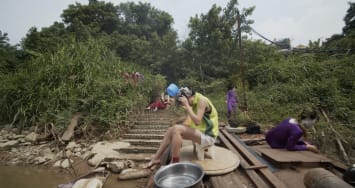Yeo Workshop Presents
The Seas Are All Shared by Ng Joon Kiat
&
Quynh Dong “Diary of Love”
THE SEAS ARE ALL SHARED BY NG JOON KIAT
In this presentation, Ng reflects on travel, both physical and digital, as a way to explore fluid identities. His post-COVID series, including Surgery and Patchwork Identity, incorporate elements of removal, recovery, and the intersection of digital and physical spaces. These works push beyond traditional painting methods, using surgical scissors and internet snapshots to convey the overlap of online and offline environments.
Ng’s recent shift from acrylic maps to watercolors symbolizes a more mobile and fluid practice, engaging with the fleeting nature of landscapes and artistic identity. His lightweight, portable artworks challenge the relevance of traditional gallery spaces, and his traveling studio practice fosters spontaneous exchanges with the public, creating intimate connections that transcend conventional hierarchies.
Ng's current work emphasizes shared human experiences and defies national boundaries, drawing inspiration from nature’s borderless forces, as seen in Looking at the South China Sea 2. His 2024 series, The Seas Are All Shared, reflects his global perspective, using art as a medium to remind us that, despite differences, the world is interconnected.
----------
QUYNH DONG "DIARY OF LOVE", 2024
Paris, October 2024 — Yeo Workshop is pleased to announce its participation in the 10th edition of ASIA NOW Paris, which runs 17-20 October 2024 at Monnaie de Paris, with the debut premiere of Quynh Dong’s latest video work, ‘Diary of Love’ (2024). She returns to the fair with a video work initiated by her own memory, this work is an experimental short film exploring the concept of love—beyond solely the romantic, but as a broader, universal, complex and multifaceted emotion. It integrates painting, moving image, performance and sculpture simultaneously, revealing Dong's fascination and mastery of mixed media as a means to challenge our understanding of each medium.
Taking a deeply personal and emotional experience as a point of departure, Dong recalls how she had left Vietnam via boat, bidding farewell to her grandparents. She articulates this specific moment as a loss of love:
“My hands hold tight to my grandfather's hands.
The ship leaves the harbour and takes me into the cold sea air. I remember my grandparents standing at the gate of the harbour. The ship is leaving, and I have left my love, my world, my home, my feelings at the port.”
Diary of Love is an attempt to portray the varying aspects and states of such an intricate emotion. Love is not linear, nor singular; it can be longing or yearning; it changes over time. Love is family, it is our country; Love could be what we think we know. The dancers in Dong’s film encapsulate the nuances and possibilities through their movement, albeit piecemeal and unassuming. Over a year in the making, from storyboard to filming, Diary of Love references images from popular culture, poetically reflecting on how media influences our social behaviour today.
Conceptually, Dong also raises the question of moving images as a medium through this solo presentation: How does one tell an emotion in a story? What narratives belong to film? Is there a definitive start and end to this story? Diary of Love is deliberately crafted and left open as a narrative, allowing for the different ‘chapters’ to be experienced as a sculpture, even a painting, which we can continually return to and interact with from another vantage point.
